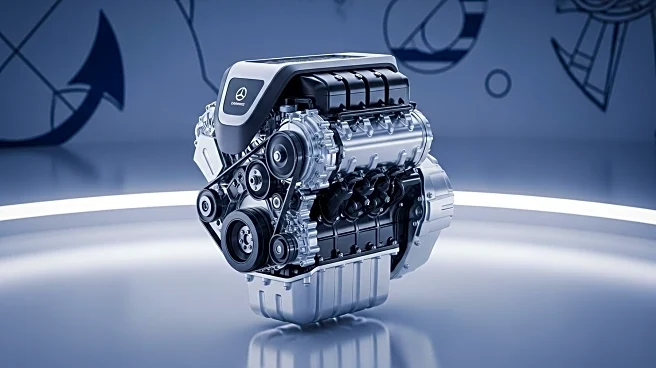What's Happening?
CIMAC Working Group 17 has released new guidelines emphasizing the importance of regulating the Methane Number for marine engines. The Methane Number, akin to the Octane Number for gasoline, measures a fuel's resistance to auto-ignition or engine knock. This is crucial for LNG, which primarily consists of methane but can include other hydrocarbons that lower its Methane Number. The group recommends maintaining a Methane Number close to 80 for optimal efficiency and reduced greenhouse gas emissions. The guidelines also stress the need for specifications to include the calculation method used for determining the Methane Number. This initiative is part of a broader effort to improve engine performance and reduce emissions from LNG-fueled ships.
Why It's Important?
Regulating the Methane Number is vital for enhancing the performance and environmental impact of marine engines. A lower Methane Number can degrade engine performance, increase emissions, and limit operational capacity. By advocating for a higher Methane Number, CIMAC aims to ensure engines operate efficiently and comply with stricter emissions regulations. This move could benefit the maritime industry by reducing greenhouse gas emissions and improving fuel efficiency, aligning with global efforts to combat climate change. Stakeholders in the LNG supply chain, including engine manufacturers and policy makers, stand to gain from these guidelines as they push for cleaner and more sustainable maritime operations.
What's Next?
Engine developers like WinGD are already taking steps to address methane emissions by joining initiatives such as the Methane Abatement in Maritime Innovation Initiative. The development of new technologies, like the Variable Compression Ratio engine, is expected to further enhance fuel efficiency and reduce methane slip. Policy makers may introduce regulations to incentivize reductions in greenhouse gas emissions across the LNG bunker supply chain. These developments indicate a shift towards more sustainable practices in the maritime industry, with potential updates to emissions factors and regulations on the horizon.
Beyond the Headlines
The push for Methane Number regulation highlights the growing importance of fuel quality in achieving environmental sustainability. As the maritime industry faces increasing pressure to reduce emissions, the focus on fuel characteristics like the Methane Number could lead to significant advancements in engine technology and fuel standards. This could also drive innovation in bioLNG blends and other alternative fuels, potentially reshaping the industry's approach to energy consumption and emissions reduction.











